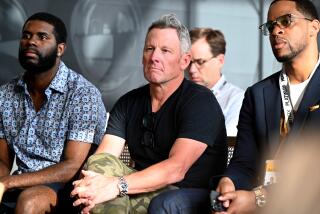Armstrong Says His Retirement Will Stand
- Share via
Lance Armstrong, seven-time Tour de France winner, said Thursday he was reinstating his retirement.
“I think it’s better that way,” Armstrong said on a conference call from his home in Austin, Texas. “I’m happy with the way my career went and ended and I’m not coming back.”
Saying he would be unable to receive a “fair shake on the roadside, in doping control or the labs,” Armstrong said he would not ride in the Tour de France next summer. “There is no way I can go back there,” he said. “I would be crazy, so why don’t we all just say I am not going back.”
Armstrong also said he had been misled by a reporter for L’Equipe, the French sports newspaper that published a story last month linking urine samples allegedly belonging to Armstrong with six positive tests for EPO, a blood-doping drug.
According to Armstrong, the reporter, Damien Ressiot, told Armstrong he was doing a story to disprove rumors that Armstrong had been given medical clearance to take EPO.
Armstrong had taken EPO in 1996 as part of his treatment for testicular cancer. Armstrong said he cooperated with Ressiot because, he said, “I have nothing to hide.”
The form was part of what Ressiot reported was proof six of Armstrong’s 1999 urine samples tested positive for EPO.
Armstrong spoke during a news conference late Thursday in response to what Armstrong’s attorney Bill Stapleton called “false and misleading” statements made earlier Thursday by Dick Pound, head of the World Anti-Doping Agency.
The L’Equipe story asserted that the French national doping laboratory, Chatenay-Malabry, had retested several cyclists’ frozen urine samples from the 1999 Tour de France by using a more sophisticated test that went into use in 2001. According to L’Equipe, it matched a medical form from Armstrong with corresponding numbers to the positive 1999 EPO tests.
After the story was published questions were raised about the quality control of the WADA-approved French lab because the frozen samples from 1999 should have remained anonymous. Several experts said they feared athlete trust in the international drug testing system could be compromised.
Thursday Pound said that the international cycling federation, UCI, was responsible for the leak.
“It’s clear the only way there could have been a match between the code numbers and a particular athlete was on the basis of information supplied by the UCI,” Pound said. He also accused the UCI of trying to “scapegoat” the French lab.
Armstrong, though, said it was Pound who was trying to find scapegoats.
“The system has seriously failed,” Armstrong said. “And when the system fails, you have to go to the head.”
Last week Armstrong said he was considering racing again because he was angry over the L’Equipe story and because he felt he had no other recourse. But now, he said, he was tired of the situation.
“I’m not coming back. I’m sitting here, my three kids are out playing in the pool and calling my name,” Armstrong said. “But I’m here talking about this. I’m sick of this.”
More to Read
Go beyond the scoreboard
Get the latest on L.A.'s teams in the daily Sports Report newsletter.
You may occasionally receive promotional content from the Los Angeles Times.








